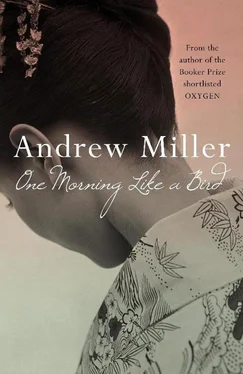Day after day through the snowfalls of early February he makes his way down to Kanda. He sleeps in Feneon’s room (the bed with the brass headboard, the springs that creak atonally every time he moves) more nights than he sleeps at home. He makes no effort to explain these absences to Miyo. He cannot tell her the truth — though he is longing to tell it to someone — and does not wish to make up stories. He pays her at least double what she was used to receiving from Father, and her duties now, a little cleaning, a little shopping, are almost non-existent, but each time he slides open the front door he half expects to find her gone, run off with the soy-seller’s son, or taken service in some household where she will not be lonely or bored.
Once a week he fire-watches. When his name appears twice on the weekly roster, he simply ignores the second duty. Being afraid of Saburo is a habit he has fallen out of, quite suddenly, a luxury he no longer has the time for. When he does take his turn, he naps in the sewing room whenever it suits him, and on one of these twenty-minute sleeps, curled on the bedding with his overcoat pulled tightly about him, he dreams he has been left alone to care for the child. He is carrying him through Asakusa to the Montparnasse cinema. Ishihara is in there, and also — though Yuji only sees him from behind, the collar patches on his uniform, the shaved grey hair above the thickset neck — General Sugiyama. It’s a Chaplin film, The Orphan . The general laughs uproariously. Ishihara twists in his seat. ‘The future,’ he says, blowing smoke into Yuji’s face.
When Yuji leaves the cinema, Emile is so small he has to hold him in the palm of his hand like a frog. He goes into a restaurant, asks for a cup to put the child in. He is no bigger than a beetle now. A gang of soldiers arrives. They invite Yuji to drink with them. One, with movements both playful and threatening, makes a present of his bayonet. When they leave, Yuji looks for the cup, but there are cups everywhere, scores of them, spread over every table, all of them empty. He searches, his heart wrung by a terror not even the fire-dreams provoked. He has lost Emile! He has lost his son! (And what can he possibly tell Alissa?) There is an instant of deranged clarity in which, alone in the nightmare restaurant, he realises he must kill himself . . then he comes to, making some grief-noise in his throat, and staggers onto the platform, gulps mouthfuls of cold dawn air until he comes to his senses, but the dream stays with him for days. Even when he holds Emile, feels the packed robustness of his body, he cannot quite pick out a last splinter of anxiety.
A telegram from Feneon. He is in Shanghai. He is well. He sends an embrace to his grandson. When Alissa shows it to Yuji, he reads it and passes it back without comment. She folds it, makes it small, then tucks it away in a pocket of the cardigan she is wearing. They look at the baby, play with the baby. When anything is in doubt, when the world threatens to force an entry, it is Emile they turn to, the power he has to root them in the present. His skin now has lost its look of long immersion and become smooth as a petal. The stump of umbilical cord that blackened and stank for a while has been shed to leave behind a clean, neat wound of separation. They lie him on the sofa, on the rug, on the bed. They examine him as though the human body was entirely new to them, their private discovery. One game, which entertains them for entire evenings, is to parcel out his features, divide them between Feneons and Takanos, between Orient and Occident. His eyes, in shape, are clearly Japanese, but their colour, hazel with gleams of new copper, comes from somewhere else. His mouth, his hands, the crown of his hair are, they agree, from the East. His nose, his feet, his skin tone, from the West. Yuji claims the child’s back, Alissa his ears, particularly the lobes. It is only during the third or fourth time they play the game that Yuji realises Alissa is hoping to assemble, from the unnattributed fragments, a picture of Suzette. As for the fear, the unvoiced fear of the child being lame, there is nothing visible, nothing in the vigour with which he writhes his limbs, to suggest any cruel inheritance. He is, in his way, perfect.
They cook for each other, eat with gusto even the most unpromising results. They read aloud from what is left of Feneon’s library: Turgenev, Chekhov, the stories of Maupassant. When they have finished the wine Yuji asks Mr Fujitomi where he can buy more, and is given the address of a house in Koshikawa, the mansion of some junior branch of a zaibatsu family where a servant, a retired sumo, leads Yuji down to a cellar lined with a thousand dusty green ends of bottles.
Fujitomi is the first person Yuji tells about Emile. They have spent half a day moving the contents of a failed shoe emporium from one end of the Low City to the other. Men’s shoes, women’s shoes, working boots, high fashion. Yuji picks out a pair of fleece-lined women’s boots.
‘You’ve someone in mind for those?’ asks Fujitomi. ‘I don’t think they’ll be missed.’
‘There’s a girl,’ says Yuji, quietly.
‘Pretty?’
‘Yes.’
‘Good for you.’
‘A foreigner.’
‘So your tastes run that way, do they?’
‘I’ve known her a long time.’
‘You’ll know the size of her feet, then.’
‘Yes.’
‘Good for you.’
‘We have a child.’
Silence. A beat of two. A beat of three.
‘A child ?’
‘A baby boy.’
‘You’re kidding, right?’
‘No.’
Fujitomi puts down the armful of rubber toilet slippers he is carrying, puffs out his cheeks, smoothes, with both hands, the skin of his scalp. ‘A little boy?’
‘Emile.’
‘Em . .?’
‘ Emile . It’s a French name.’
‘French . . You certainly know how to throw a surprise.’
‘He was born before the New Year.’
‘A Dragon boy?’
‘Yes.’
‘And the hour?’
‘Ox, I think.’
‘Highly auspicious.’
They laugh together.
‘A little unofficial boy,’ says Fujitomi, a sudden fleeting melancholy in his expression. ‘A little international boy, well, well . . Who else knows about this? Your father?’
Yuji shakes his head.
‘You better start thinking what you’re going to say. You won’t be able to keep something like this quiet for long.’
‘I know.’
‘And the girl, the one who’s going to be walking around in fleece-lined boots, what about her?’
‘She will leave.’
‘Leave?’
‘Japan.’
‘With the kid? Em . .?’
‘Emile. Yes.’
‘Where will they go?’ He holds up a hand. ‘No. Don’t answer that. It’s none of my business.’ He grimaces. ‘If you’re asking for advice. .’
‘I’m not asking for advice,’ says Yuji. ‘I know there’s nothing anyone can do.’
‘Do? Oh, I wouldn’t say that ,’ says Fujitomi, rummaging for a box. He finds one and packs the boots carefully inside. ‘I hope she likes them,’ he says. It is difficult to read the message in his eyes. Perhaps it is just difficult to take it seriously.
On 22 February a telegram arrives from Hong Kong. It is as brief, as portentous, as the one that preceded it. The same day, in Hongo, there is a letter for Yuji from Father. They have been snowed in for more than two weeks, though now a thaw will allow him to reach the store on the road below the farm where mail is accepted and sent on to the city. Mother has caught a chill but seems otherwise to find the mountain beneficial. On three occasions she has joined the family for the midday meal. As for himself, he has become quite the rustic, cutting wood, clearing snow off the roof, feeding the hens (those the foxes have not yet caught). What is Yuji’s opinion of the situation in Setagaya? What are the doctors saying? He will, as soon as the weather permits, take the train to Tokyo.
Читать дальше












